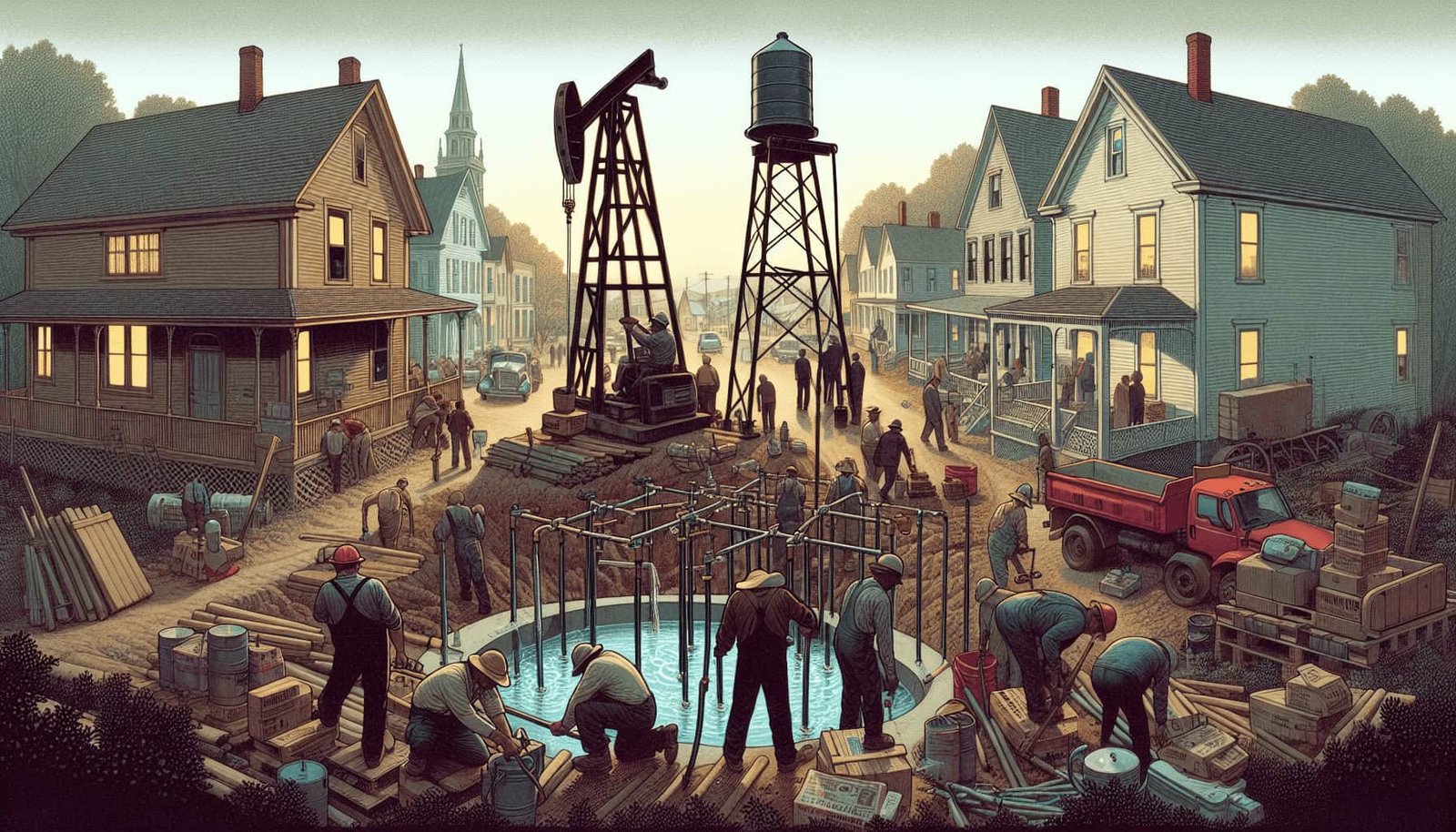In Belle Plaine, the local community is taking steps to improve their water wells. With recent news of contaminated drinking water wells in other areas, the residents of Belle Plaine are determined to ensure the safety and quality of their own water supply. From upgrading existing wells to implementing new maintenance protocols, the community is coming together to prioritize the health and well-being of its residents. This article explores the efforts being made in Belle Plaine and highlights the importance of maintaining reliable water sources for a thriving community.

Current state of Belle Plaine water wells
The current state of Belle Plaine water wells is a matter of concern for the community. An analysis of the existing water wells has revealed several issues, including water quality concerns and a limited water capacity. These issues pose a threat to the long-term sustainability and well-being of the community. It is crucial to address these problems and explore potential solutions for upgrading the water wells in Belle Plaine.
Issues with current water wells
The current water wells in Belle Plaine are facing various issues that need to be addressed. One of the primary concerns is the water quality. There have been reports of contamination and the presence of harmful substances in the water supply. This compromises the safety and cleanliness of the water, potentially endangering the health of the residents. Additionally, the current water wells have limited capacity, which means they may not be able to meet the growing water demands of the community. This can lead to water shortages and the need to rely on external water sources, which is not sustainable in the long run.
Water quality concerns
Water quality concerns in Belle Plaine are a significant issue that needs immediate attention. The presence of contaminants and pollutants in the water supply poses a threat to the health and well-being of the residents. These contaminants can come from various sources, including industrial activities, agricultural runoff, and aging infrastructure. Addressing these water quality concerns is crucial to ensure that the residents have access to clean and safe drinking water. Upgrading the water wells can help improve the filtration and treatment systems, ensuring that the water meets the necessary quality standards.
Goal of upgrading water wells
The primary goal of upgrading the water wells in Belle Plaine is to address the existing issues and improve the overall water quality and capacity. By upgrading the water wells, the community aims to enhance the access to clean and safe water, reduce reliance on external water sources, and ensure the long-term sustainability of the water supply. These upgrades will not only benefit the residents but also contribute to the overall health and well-being of the community.

Improving water quality
Improving water quality is one of the key objectives of upgrading the water wells in Belle Plaine. By implementing advanced filtration systems and treatment technologies, the contaminants and pollutants can be effectively removed from the water supply. This will help ensure that the residents have access to clean and safe drinking water, free from harmful substances. The upgrade will also involve regular monitoring and testing of the water quality to ensure compliance with the necessary standards.
Increasing water capacity
Another important goal of upgrading the water wells is to increase the water capacity. The current water wells may not be able to meet the growing demands of the community, leading to water shortages and reliance on external water sources. To address this issue, upgrading the pumping infrastructure and drilling new wells can help increase the water capacity. This will ensure that the community has an adequate and reliable water supply to meet its needs, even during periods of high demand or drought.

Ensuring long-term sustainability
Ensuring the long-term sustainability of the water supply is a critical objective of upgrading the water wells in Belle Plaine. By addressing the existing issues and implementing appropriate upgrades, the community can reduce its reliance on external water sources and establish a self-sustaining water system. This will help protect the natural resources and ensure that future generations have access to clean and safe water. The upgrades will also consider the environmental impact and strive to minimize any potential adverse effects on the ecosystem.
Potential solutions for upgrading water wells
To upgrade the water wells in Belle Plaine, several potential solutions can be explored. These solutions include exploring new drilling techniques, implementing advanced filtration systems, and upgrading the pumping infrastructure.
Exploring new drilling techniques
New drilling techniques can help improve the efficiency and productivity of the water wells. Advanced drilling technologies, such as horizontal drilling or geothermal drilling, can provide better access to underground water sources and increase the water yield. These techniques can also help minimize the environmental impact and reduce the disruption to the community during the upgrading process.
Implementing advanced filtration systems
Implementing advanced filtration systems is crucial for improving water quality. By installing state-of-the-art filtration technologies, contaminants and pollutants can be effectively removed from the water supply. This will ensure that the residents have access to clean and safe drinking water. The filtration systems can be designed to target specific contaminants based on the local water quality issues.
Upgrading pumping infrastructure
Upgrading the pumping infrastructure is essential for increasing the water capacity and ensuring a reliable water supply. This can involve replacing old and inefficient pumps with newer models that are more energy-efficient and have higher water output. Upgrading the pumping infrastructure will also involve improving the storage and distribution systems to meet the growing demands of the community.

Assessing the feasibility of upgrades
Assessing the feasibility of upgrades is crucial to determine the viability and potential challenges associated with the project. This assessment will involve conducting a cost analysis, evaluating the environmental impact, and establishing a timeline for implementation.
Cost analysis
A cost analysis will help determine the financial implications of the water well upgrades. This analysis will involve estimating the upfront costs of drilling new wells, installing filtration systems, and upgrading the pumping infrastructure. It will also consider the long-term operational and maintenance costs. By conducting a comprehensive cost analysis, the community can assess the affordability of the upgrades and explore funding options.
Environmental impact assessment
An environmental impact assessment is necessary to evaluate the potential ecological consequences of the water well upgrades. This assessment will involve studying the local ecosystem, identifying any potential risks or negative effects, and developing appropriate mitigation measures. It will also consider the sustainability and conservation of natural resources. By conducting an environmental impact assessment, the community can ensure that the upgrades align with sustainable practices and minimize harm to the environment.
Timeline for implementation
Establishing a timeline for implementation is crucial for effectively executing the water well upgrades. This timeline will outline the various stages of the project, including the drilling, filtration system installation, and pumping infrastructure upgrades. It will consider factors such as the availability of resources, the complexity of the upgrades, and the potential disruption to the water supply during the implementation. By having a clear timeline, the community can plan and coordinate the necessary actions to ensure a smooth and timely completion of the upgrades.
Benefits of upgrading water wells
Upgrading the water wells in Belle Plaine will bring several benefits to the community. These benefits include improved access to clean and safe water, reduced reliance on external water sources, and enhanced community health and well-being.
Improved access to clean and safe water
One of the primary benefits of upgrading the water wells is improved access to clean and safe water. By addressing the water quality concerns and implementing advanced filtration systems, the residents will have access to high-quality drinking water. This will improve their health and well-being and reduce the risk of waterborne diseases. Clean and safe water is essential for daily activities such as drinking, cooking, and personal hygiene.
Reduced reliance on external water sources
Upgrading the water wells will also reduce the community’s reliance on external water sources. Currently, the limited water capacity of the existing wells forces the community to seek water from other areas, which can be costly and unsustainable. By increasing the water capacity and improving the efficiency of the water supply, the community can become more self-reliant and reduce the need for external water sources. This will provide greater water security and ensure a reliable supply even during periods of high demand or drought.
Enhanced community health and well-being
Access to clean and safe water is closely linked to community health and well-being. By upgrading the water wells and improving the water quality, the community members will experience better health outcomes and a higher quality of life. Clean water is essential for hydration, nutrition, and sanitation. It plays a crucial role in preventing waterborne diseases and promoting overall well-being. By enhancing the community’s access to clean and safe water, the upgrades will contribute to the overall health and quality of life in Belle Plaine.

Challenges and obstacles
Upgrading the water wells in Belle Plaine may face several challenges and obstacles that need to be addressed. These challenges include limited budgetary resources, potential disruption to the water supply during upgrades, and approval and regulatory hurdles.
Limited budgetary resources
One of the primary challenges that the community may face is limited budgetary resources. Upgrading the water wells can be a significant investment, requiring funds for drilling new wells, installing filtration systems, and upgrading the pumping infrastructure. Securing the necessary financial resources can be a challenging task, especially for a small community with limited financial means. The community will need to explore funding options such as grants, public-private partnerships, and community fundraising initiatives to overcome this challenge.
Potential disruption to water supply during upgrades
Another challenge that needs to be addressed is the potential disruption to the water supply during the upgrades. The construction and installation process may temporarily disrupt the water flow, leading to interruptions in the water supply for the residents. Minimizing these disruptions and ensuring a smooth transition is crucial to prevent inconvenience and address any concerns from the community. Clear communication and alternate water supply arrangements may be necessary to mitigate the impact on the residents.
Approval and regulatory hurdles
Navigating the approval and regulatory process can be a significant challenge in upgrading the water wells. The community will need to comply with various local, state, and federal regulations and obtain the necessary permits and approvals. This can involve a complex and time-consuming process, requiring coordination with government agencies and stakeholders. Overcoming these hurdles will require careful planning, effective communication, and engagement with the relevant authorities.
Community engagement and support
Community engagement and support are vital in the process of upgrading the water wells in Belle Plaine. Educating the residents about the need for upgrades and seeking their input and feedback will help build awareness and support for the project. Establishing partnerships with local organizations, community groups, and stakeholders will also facilitate collaboration and collective decision-making.
Educating residents about the need for upgrades
Educating residents about the need for water well upgrades is essential to build awareness and support. This can involve community meetings, public forums, and informational campaigns to explain the importance of addressing the water quality concerns and increasing the water capacity. Providing clear and transparent information about the benefits and potential challenges of the upgrades will help residents understand the necessity of the project and encourage their participation.
Seeking input and feedback from stakeholders
Seeking input and feedback from stakeholders is crucial for effective decision-making and project planning. Engaging with residents, community organizations, and local businesses will provide valuable insights and perspectives. This can be done through surveys, focus groups, and public consultations. Incorporating the feedback and suggestions into the project design and implementation will ensure that the upgrades align with the needs and priorities of the community.
Building partnerships with local organizations
Building partnerships with local organizations can enhance the success of the water well upgrades. Collaborating with environmental groups, community associations, and educational institutions can bring additional expertise, resources, and support. These partnerships can help streamline the project implementation, ensure a broader community reach, and leverage funding opportunities. By working together, the community can overcome challenges and achieve the desired outcomes more effectively.
Success stories from other municipalities
Learning from the success stories of other municipalities can provide valuable insights and best practices for the water well upgrades in Belle Plaine. Case studies of successful water well upgrades can showcase the positive impacts and outcomes achieved in similar projects. These success stories can help inform the decision-making process, guide the selection of appropriate technologies and strategies, and identify potential pitfalls to avoid.
Case studies of successful water well upgrades
Examining case studies of successful water well upgrades in other municipalities can provide valuable lessons learned and inspiration. This can involve studying the approaches taken, the technologies implemented, and the outcomes achieved. Case studies can showcase the benefits and challenges associated with different upgrade strategies, helping the community make informed decisions and tailor the upgrades to its specific needs.
Lessons learned and best practices
Identifying lessons learned and best practices from successful water well upgrades is crucial for the success of the project in Belle Plaine. By understanding the factors that contributed to the success of previous projects, the community can implement similar strategies and avoid potential pitfalls. This can include lessons related to community engagement, project management, technology selection, and ensuring long-term sustainability. By applying these best practices, the community can increase the chances of a successful outcome.
Replicating successful models in Belle Plaine
Replicating successful water well upgrade models in Belle Plaine can provide a roadmap for the project. By adapting and applying successful strategies and approaches from other municipalities, the community can streamline the implementation process and improve the efficiency and effectiveness of the upgrades. This can involve collaborating with experts and consultants who have experience in similar projects. It will also require tailoring the models to the specific needs and context of Belle Plaine.
Funding options for water well upgrades
Securing the necessary funding is a critical component of the water well upgrades in Belle Plaine. Several funding options can be explored to support the project, including grants and funding opportunities, public-private partnerships, and community fundraising initiatives.
Grants and funding opportunities
Grants and funding opportunities are valuable sources of financial support for the water well upgrades. The community can explore grants offered by government agencies, non-profit organizations, and foundations that focus on water infrastructure projects. It is essential to research and identify the eligibility criteria, application processes, and deadlines for these grants. Building strong grant proposals that align with the funding requirements increases the chances of securing the necessary funding.
Public-private partnerships
Public-private partnerships can provide significant financial and technical support for the water well upgrades. Collaborating with private sector entities, such as water utilities or engineering firms, can bring additional expertise, resources, and funding. These partnerships can be established through formal agreements and contracts, outlining the roles, responsibilities, and financial contributions of each partner. Public-private partnerships can help leverage private sector investments and accelerate the implementation of the upgrades.
Community fundraising initiatives
Community fundraising initiatives can complement other funding sources and engage the residents in the project. This can involve organizing fundraising events, crowdfunding campaigns, or establishing community funds dedicated to the water well upgrades. Engaging the community in fundraising activities fosters a sense of ownership and promotes a collective effort towards achieving the project goals. It is essential to communicate the purpose and benefits of the upgrades to encourage participation and financial contributions from the community members.
Next steps and action plan
To move forward with the water well upgrades in Belle Plaine, the community should establish a clear next steps and action plan. This plan will involve forming a task force, developing a comprehensive project plan, and securing necessary approvals and permits.
Forming a task force for water well upgrades
Forming a task force dedicated to the water well upgrades is crucial for effective project management and coordination. The task force should consist of representatives from the community, local organizations, and relevant stakeholders. This group will be responsible for overseeing the project, making key decisions, and ensuring the successful implementation of the upgrades. Clear roles and responsibilities should be assigned to each member of the task force to promote accountability and collaboration.
Developing a comprehensive project plan
Developing a comprehensive project plan is essential for guiding the water well upgrades. This plan should outline the project objectives, timeline, budget, and key milestones. It should also include a detailed description of the upgrade strategies, technologies, and intended outcomes. The project plan should be flexible and adaptable to accommodate potential changes, challenges, and opportunities that may arise during the implementation process. Regular monitoring and evaluation will help track progress and make necessary adjustments to ensure the project’s success.
Securing necessary approvals and permits
Securing necessary approvals and permits is a critical step in the water well upgrades. The community will need to comply with local, state, and federal regulations and obtain the permits required for drilling, construction, and installation. This process may involve working with regulatory authorities, conducting environmental assessments, and addressing any concerns or objections from stakeholders. Ensuring compliance with all legal requirements will help mitigate potential risks and challenges during the implementation process.
In conclusion, upgrading the water wells in Belle Plaine is essential to address the current issues with water quality and capacity. By implementing solutions such as advanced filtration systems, exploring new drilling techniques, and upgrading pumping infrastructure, the community can ensure improved access to clean and safe water, reduce reliance on external sources, and enhance community health and well-being. However, these upgrades may face challenges such as limited budgetary resources, potential disruption to the water supply, and approval and regulatory hurdles. Engaging the community, learning from success stories, and exploring funding options are key to overcoming these challenges. By forming a task force, developing a comprehensive project plan, and securing necessary approvals, the community can take the next steps towards upgrading the water wells and ensuring a sustainable water supply for Belle Plaine.
